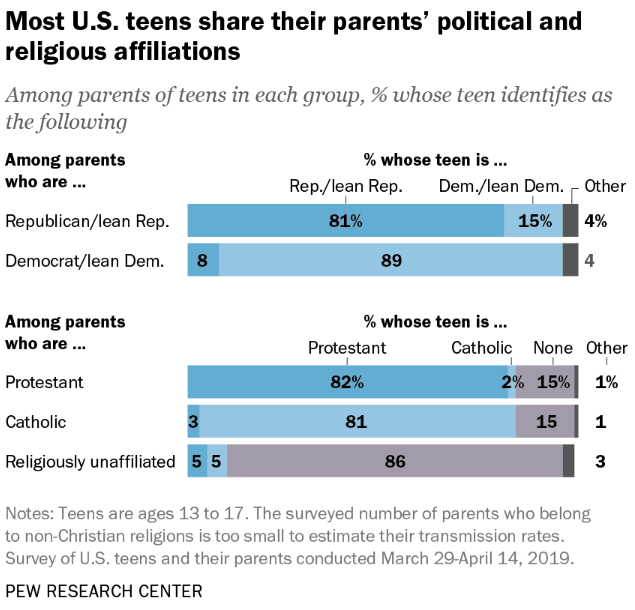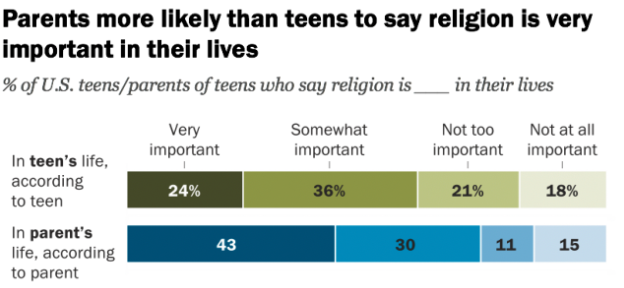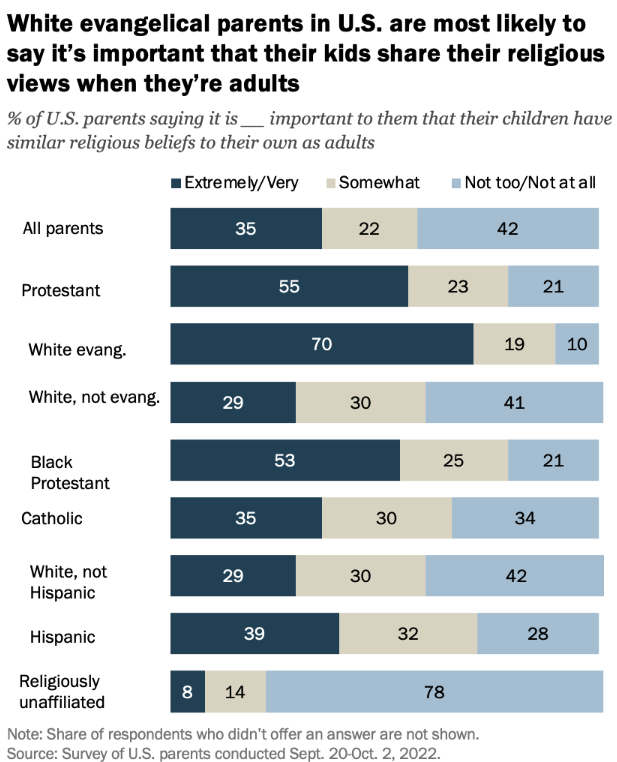While most American parents say it’s more important to share faith than political orientation with their children, research shows they are doing a pretty good job of doing both, Pew Research Center reports.
“This may be surprising, considering that parents are more likely to prioritize the transmission of their religious views than their political views. In a fall survey by the Center, 35% of U.S. parents said it was extremely or very important that their kids grow up to share their religious views, while fewer than half as many (16%) said the same about their political views.”
That survey also found that sharing values like honesty, ethical behavior and working hard are considered much more important than passing along religious or political orientation, Pew researchers said.

Even so, 70% of white evangelicals said it’s important their children share their religious beliefs, followed by 55% of other Protestants, 53% of Black Protestants, 39% of Hispanics and 35% of all U.S. parents. Among the religiously unaffiliated, 78% said it is “not too” or “not at all” important their children share their views on faith.
Responses were dependent on the frequency of attendance at church or other religious services, the researchers found. “Parents who attend religious services weekly or more often are more than three times as likely as those who attend less often to say it’s important to raise children who will share their religious views (76% vs. 21%).”
Only 16% of U.S. parents said it is “extremely” or “very” important their children grow into adults with political views similar to their own.
However, Pew polling found teens are about half as likely as their parents to say religion is “very important” in their lives. While children may identify in the same religious tradition as their parents, the effect appears more diluted.

Pew also reported an analysis of previous surveys shows parents are sharing both religious and political affiliations with their children at nearly equal rates.
A 2019 survey of U.S. teens “indicated that the vast majority of parents with teens have passed along their political loyalties. Roughly eight in 10 parents who were Republican or leaned toward the Republican Party (81%) had teens who also identified as Republicans or leaned that way. And about nine in 10 parents who were Democratic or leaned Democratic (89%) had teens who described themselves the same way.”
Parents displayed similar efficiency transmitting religious belief to their children, Pew added. “In the same 2019 survey, 82% of Protestant parents had teens who also identified as Protestant, 81% of Catholic parents had Catholic teens, and 86% of religiously unaffiliated parents — those who described themselves as atheist, agnostic or nothing in particular — had teens who were also ‘nones.’”

The research did not produce enough data to measure these trends among non-Christian religious groups, but Pew was able to examine transmission rates among Christian sub-groups.
“Among evangelical Protestant parents of all races and ethnicities, for example, 80% had teens who identified as evangelicals, and an additional 7% had teens who identified with other Protestant traditions. Just 12% had teens who were unaffiliated and 1% had teens who were Catholic. In other words, even though evangelical Protestants place much higher importance on passing their religion to their children than religiously unaffiliated parents do, the two groups are about equally successful at actually doing so, at least through about age 17.”
Knowing that many young adults change religious affiliations or abandon established religions between ages 18 and 29, Pew tapped into another survey to compare respondents’ current affiliations with those of the people who raised them.
“The (2015) survey found that most people who were raised in a single religion — either by two parents of the same faith or by a single parent —retained that religion. Roughly eight in 10 of those raised Protestant (79%) were still Protestant. About six in 10 of those raised Catholic were still Catholic (62%), and an identical proportion of those raised with no religious affiliation were still unaffiliated (62%).”
A much greater variation was detected in the 21% of adults who grew up in interfaith households, according to the report. “Among those raised by two people, one of whom was Protestant and the other unaffiliated, the Protestant identity proved to be ‘stickier’: 56% identified as Protestant, while 34% were unaffiliated, 3% were Catholic, and 7% belonged to other religions Among those raised by two people, one of whom was Catholic and the other unaffiliated, 42% were unaffiliated in adulthood while 32% were Catholic, 20% were Protestant, and 5% identified with other religions.”
The outcome was a “toss-up” among individuals raised by a Protestant and a Catholic, according to the survey. “In adulthood, 38% identified as Protestant, 29% were Catholic, 26% were unaffiliated, and 7% belonged to other religions.”
Despite the rates of religious adherence among children, Pew’s 2019 study found it’s invariably less than parents themselves.
“When there are religious differences between adults and their 13- to 17-year-old children, however, it’s usually the teens who are less religious than the parents. For instance, far fewer teens (24%) than parents (43%) say that religion is very important in their lives.”


